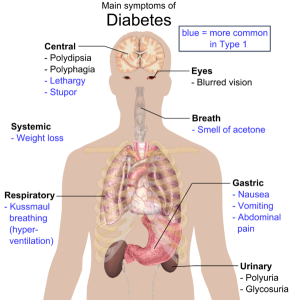Researchers from the Weizmann Institute of Science in Israel and their colleagues demonstrated how artificial sweeteners can disrupt the regulation of glucose tolerance, causing concern that the tasty non-calorie additives may be aiding in the obesity and diabetes epidemics.

Public domain image/Mikael Häggström
The method of action was based on a response by the gut microbiota. In mice, it had been previously shown that sucralose (Splenda) depleted beneficial microbes within a mouse gut. This current study fed 10% solutions of three different artificial sweeteners- saccharin, sucralose, or aspartame- and showed that mice had an increase in blood glucose compared to water- or glucose-treated control mice. Mice fed saccharin solutions, which caused the highest spike in blood sugar, and a high fat diet together showed blood sugar levels comparable to mice fed enormous amounts of saccharin, demonstrating that diet can significantly impact the effect of the sweeteners.
Shotgun metagenomic sequencing confirmed the mice receiving the sweeteners had altered gut microbiomes, and when transferred into normal mice, these altered gut microbiota caused obesity and glucose sensitivity. “This is the elegant and home run experiment that shows causality in mice,” said University of Chicago pathologist Cathryn Nagler.
One caveat to this study is the amount of sweetener given to the mice. Daily consumption of a single can of diet soda will provide a maximum of 125mg of artificial sweetener, representing a 0.04% solution. But the maximum amount of sweetener deemed safe by the FDA is far above this level. Indeed, when healthy human volunteers in this study ingested the highest allowable level of saccharin for 1 week, over half exhibited altered glucose profiles compared to their pre-study levels. Those with the worst glycemic response had the most profound changes in gut microbiota.
“I am very excited about these results because they demonstrate the need for more research,” said Yanina Pepino of Washington University in St. Louis School of Medicine. “There are many aspects of these sweeteners that we don’t understand”. In truth, the levels given to the test subjects are at the extreme end of the safe range and unlikely to be experienced by a normal user of artificial sweeteners. But this study does show that certain individuals are more susceptible to the metabolic effects of artificial sweeteners, and that studies into gut microbiota may further elucidate the mechanisms by which metabolism is altered by dietary enhancements.


Excellent article. I absolutely love this website. Thanks!